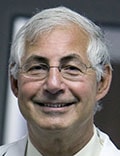Vagina.
For decades, even centuries, Western societies haven't found a way to completely accept this word and this complicated and vital body part, including its role in women's sexual pleasure. This remains particularly true in healthcare.
More than 4 in 10 premenopausal women worldwide experience sexual dysfunction, research shows. Yet nowhere near this number have access to or knowledge of specialists and solutions to navigate an issue that can be both physical and emotional.

Kelly Casperson, MD
Kelly Casperson, MD, urologist and author of a recent book on female sexual pleasure, You Are Not Broken, remembers a patient crying in her office about her sexless marriage and lack of desire after bladder cancer.
"It gave me a flashback to my training in urology," she says, "where they were like, 'Women are complicated. We'll never figure them out. And the gynecologists are helping them anyway, so we don't really know.' I was like, 'Oh, is that actually true?'"
Casperson calls this the culminating moment where her (lack of) education on the topic collided with her drive to help her patient. Her passion project outside work — the book — became her statement on the subject.
Casperson isn't alone. Other sexual health physicians now pursue advocacy outside of clinical practice or research, writing books on the topic and venturing into social media, high-school sex ed, and even the sex toy industry in an effort to improve women's sexual — and therefore physical and mental — health.
A Slow Evolution for Sexual Health Medicine
Women's sexual health issues are rooted in and interchangeable with women's history of oppression as the "second" sex, some of our experts point out. Irwin Goldstein, MD, director of San Diego Sexual Medicine and founding editor of The Journal of Sexual Medicine, recalls thousands of phone calls from women pouring in after Viagra became popular in the late 1990s as a treatment for male erectile dysfunction.

Irwin Goldstein, MD
"It was an unheard-of concept," Goldstein says, "Women were saying, okay, now men have this. I have pain when I'm having sex. I have poor orgasm quality. I get migraines when I have an orgasm. I'm not interested in sex. I can't engorge — I'm not aroused. I have orgasms 24/7 and I hate it."
At the time, Goldstein assumed there was a track within gynecology to study women's sexual health, but he found the opposite. He describes the general attitude as, "We don't know about this. We don't want to know… [Put] your head in the sand."
Although there has been progress over the decades, the mindset is difficult to reverse.
Women's Health Meets Women's Rights
Amir Marashi, MD, FACOG, FACS, an Iranian-born ob/gyn, is a pelvic pain specialist and surgeon often referred to as the "vagina whisperer." He sees links between supporting female sexuality and combatting sexism and misogyny. Growing up in Iran assisting his physician father with orthopedic surgeries from the age of 4, Marashi quickly realized the inequities in women's and men's sexual health standards.

Amir Marashi, MD
"Back then, I always saw how oppressed women were in our culture," he says. "Then I realized it's everywhere. I went to England. I came to America. I saw exactly the same thing, just different. You don't have to cover your head [in the West], but you're still judged. They'd shame you with 'she's a slut.'" Marashi says even his own father had a double standard between him and his sister.
As a medical student in Iran, Marashi performed secret hymen restoration surgeries on women in danger of being murdered over questions of virginity. And he continues to work with victims of genital mutilation, which he says he saw "by the dozen" when he was practicing in Brooklyn, New York.
But Marashi's mission to "eradicate sexual shame and put an end to orgasm inequity" has also led him outside of medicine. A vocal advocate for women's sexual health on social media, he released a coffee-table book in 2020, A Woman's Right to Pleasure, a collection of texts and artwork on female sexuality from female artists, writers, and creative thinkers.
In 2022, Marashi launched a female pleasure product company, Cerē. One of the company's bestsellers is Lalalena, a vibrator in the shape of the full clitoris, including the parts you can't see on the outside of the body.
"We wanted to empower women by bringing the clitoris to the forefront," Marashi says. "We thought to ourselves: What if we made a vibrator in the shape of the organ it was meant to stimulate (the clitoris), fitting along it like a glove? It has never been done."
Getting Loud on Social Media
For sexual health experts, making statements designed to be heard can require getting out of their comfort zones. That means having frank discussions and acknowledging language that professional decorum discourages. It also means connecting with the wider female population, and other physicians, by meeting them where they are — on social media.

Rachel Rubin, MD
Rachel Rubin, MD, a board-certified urologist, sexual medicine expert, and educator in the field, is informally called the "clitorologist." Rubin has advocated for further education around the vulva and clitoris and urges providers to routinely examine them.
In a recent New York Times article, she argues that the organ is "completely ignored by pretty much everyone," which is devastating to women's sexual health. On social media, she has found a receptive audience.
Rubin says she chooses "whatever raises my blood pressure" to discuss on Twitter or Instagram. After her first tweet, she recalls, "I realized nobody stops me. I got really loud. The more I tweeted, the more I learned, lifting other people up and educating through love and awareness and consistent content over and over again. It snowballs."
Her approach seems to be working. In a 2019 tweet, Rubin urged urologists to "change their practice pattern" around genitourinary syndrome of menopause, an updated term for vaginal atrophy.
"The labia minora LITERALLY fade away!" Rubin wrote. "If all penises shriveled up starting at age 52, we'd have vaccines available for prevention." Rubin's advocacy helped spur the American Urologic Association to create a guideline on genital urinary syndrome of menopause.
Rubin also posts on Instagram about all the topics missing from high school sex ed, and she returns to her own high school annually to talk about sex ed and healthy relationships.
For Rubin, sexual medicine involves complex situations and a "biopsychosocial approach." Realizing that she couldn't help her patients in the 10 minutes allotted by insurance companies for "very sensitive topics," she moved outside the traditional clinical model to a cash-based practice.
Her patients now engage in a 3-hour multidisciplinary sexual health evaluation, which includes a physical therapist, sex therapists, a urologist, and others. This is usually not covered by insurance, which limits Rubin's clientele to those who can afford to pay out of pocket.
Sexual Health Is Mental Health
The connection between sexual and mental health is also essential, experts say. Those in the field call for more analysis of how the two are intertwined, though as one researcher states, we "need not be sexologists" to understand that sexuality is a basic aspect of mental health.
A 2018 review even suggested that depression, anxiety disorders, and some sexual dysfunctions might all result from "a shared underlying latent psychological vulnerability." The authors highlighted research showing that the most common type of women's sexual pain is 10 times more likely in someone with previously diagnosed anxiety.
Secrecy and shame certainly contribute to both concerns and extend to anatomical variations as well. Marashi recalls a 15-year-old patient who was being bullied on the swim team for the shape of her labia. Other swimmers called her "Philly cheesesteak" and told her that her "beef was hanging out." She quit swimming and attempted suicide three times.
Marashi had never performed labiaplasty on anyone under 18, but once he heard her story, he made an exception. There was one catch: She'd go back to the swim team, which she did. The story points to the mental health impacts of what some consider just a cosmetic procedure, he explains. "I tell them you don't need it," he says, "but they can decide for themselves. You can decide about your body."
In private messages, Casperson hears from her readers and followers about their improved sexual and mental health. In one DM, a fan detailed how ob/gyn visits were always painful for her. Her doctor told her to be quiet when she cried out, causing significant psychological trauma.
Based on Casperson's online resources and education, the patient found a sexual wellness doctor who prescribed medication that "completely resolved" her pain.
Another grateful reader writes, "You have helped me so very much. Sex with my husband of 18 years is now so much more fulfilling. Desire has returned and I actually am able to orgasm. It took me a while to figure it all out and understand how to create confidence and desire. Thank you!"
For more news, follow Medscape on Facebook, Twitter, Instagram, and YouTube
Credits:
Lead image: Alena Menshikova/Dreamstime
Image 1: Kelly Casperson
Image 2: Irwin Goldstein
Image 3: Amir Marashi
Image 4: Rachel Rubin
Medscape Medical News © 2023 WebMD, LLC
Send news tips to news@medscape.net.
Cite this: Vagina Dialogue: MDs Push to Promote Female Sexual Wellness and Pleasure - Medscape - May 24, 2023.






Comments